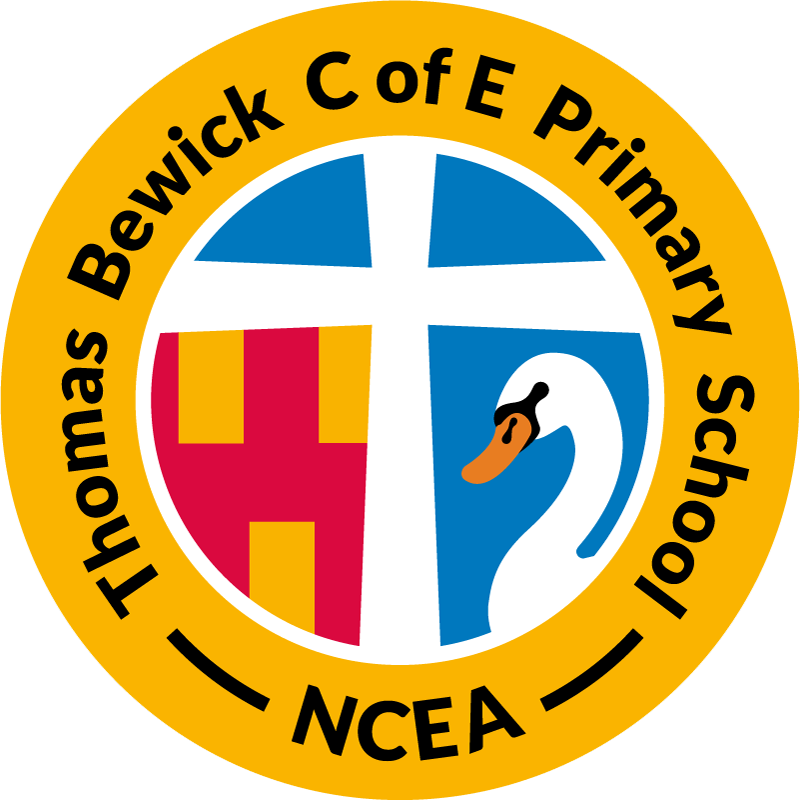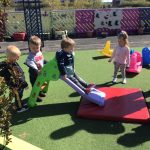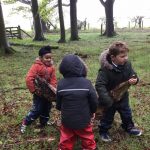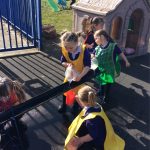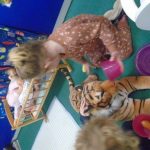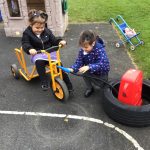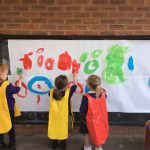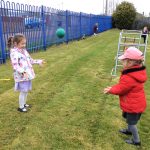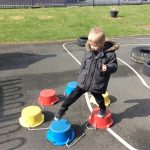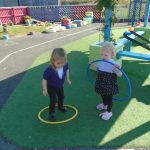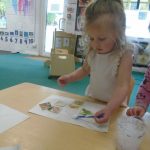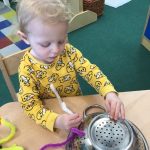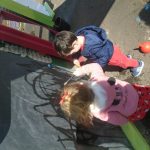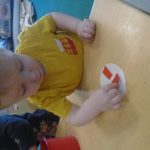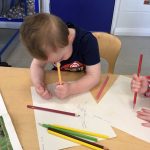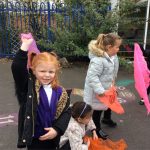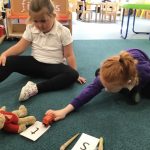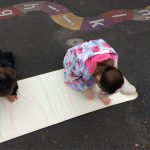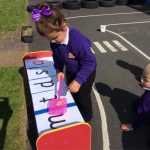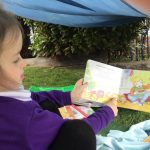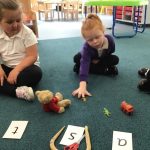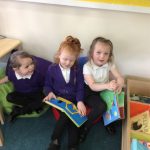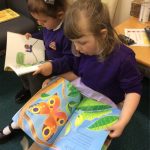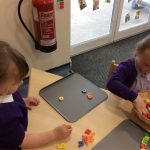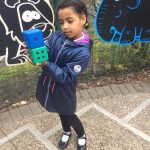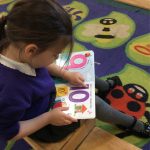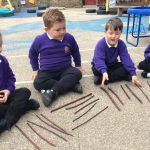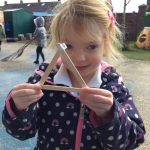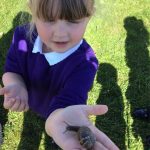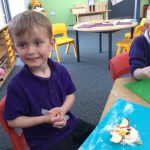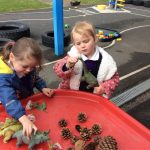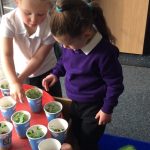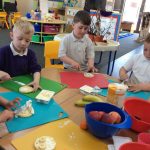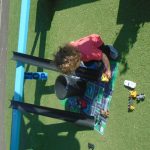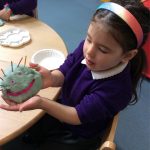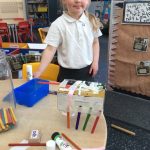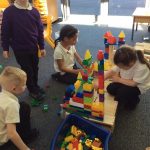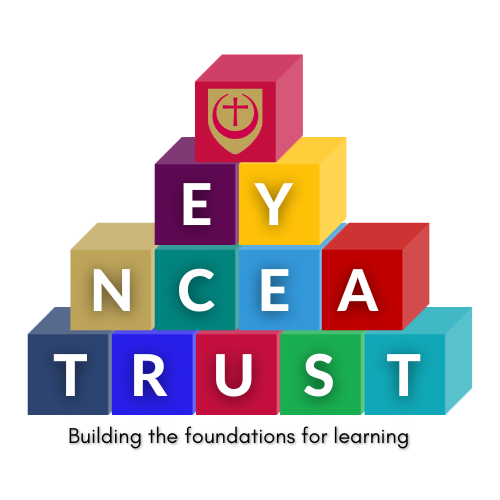
The Early Years Foundation Stage Curriculum is broken down into 7 areas of learning – 3 Prime and 4 Specific. The Prime Areas are the fundamental parts of development which children need in order to develop fully in all of the other Specific Areas of learning.
Click to expand the drop down areas below to find out more about each area.
Prime Areas of Learning
What does Personal, Social and Emotional Development look like in Early Years at the NCEA Trust?
At NCEA Trust we know the importance of Personal Social and Emotional Development. This is our starting point, children (and their parents/carers) need to know that they are secure and safe in our care.
We believe that happy, confident children are children who are ready to learn. Adults spend time getting to know each child individually and develop positive relationships with them. They show the children how to cooperate with each other and develop friendships.
We talk about our different emotions and provide strategies for the children to express and manage them. We support them to have a positive view of themselves and their abilities. As the children become more familiar with routines we see their confidence grow and that willingness to try new things increase.
The staff scaffold the children’s learning allowing them to engage in activities that they may feel are initially tricky or scary. We teach them specific skills such as how to look after their own bodies and healthy eating as well as developing independence with personal needs. They are shown the importance of being respectful towards others and they gain an understanding of different religions and cultures.
Find out more about Personal, Social and Emotional Development in our:
Photo Gallery – Personal, Social and Emotional Development
What does Communication and Language look like in Early Years at the NCEA Trust?
At NCEA Trust children’s Communication and Language skills are a high priority. Our aim is for all children to be confident communicators. We aim for them to be able to share their ideas and opinions with others, listen and use talk to solve problems and organise their thinking and so these are key skills that we focus on.
We share stories with the children on a daily basis and our curriculum has been developed around these stories developing and embedding vocabulary. Active engagement in storytelling, story making, role play as well as knowing lots of different rhymes and poems in an environment rich in language gives the children opportunities to explore new words and new worlds. We also explore non-fiction books to extend children’s knowledge and understanding.
The staff support children by introducing new words, developing conversations and helping children to listen carefully. We also focus on specific skills such as following and understanding instructions, developing auditory skills and interacting with others. Adults show the children by modelling appropriate questions and sentences and describing what they are doing.
Children with Communication and Language difficulties are identified early and support is given with focussed activities, parents and outside agencies are involved.
Find out more about Communication and Language in our:
Photo Gallery – Communication and Language
What does Physical Development look like in Early Years at the NCEA Trust?
At NCEA Trust we want all of our children to live happy, healthy and active lives. Physical development is fundamental to their all-round development. We place a high importance on healthy bodies and healthy minds.
Children have daily opportunities to develop their gross and fine motor skills, both inside and outside as we are really lucky to have access to large outdoor spaces. These are taught through focussed sessions as well as opportunities to play and explore.
Children are observed and assessed regularly and staff provide resources and activities to enable them to progress further. We have a healthy snack each day and the children have the opportunity to try different foods and we discuss the importance of healthy choices. We work with parents and health visitors to support children in having a healthy lifestyle.
Find out more about Physical Development in our:
Photo Gallery – Physical Development
Specific Areas of Learning
What does Literacy look like in Early Years at the NCEA Trust?
Our curriculum is based around story books, non-fiction books, rhymes and poems. We want children to gain a love of reading and a joy of books from a very young age.
We feel that stories enable the children to find out more about the world around them and have the opportunity to explore real and imaginary places. They enable children to experience different situations, cultures, feelings and learn new facts.
Adults share stories and rhymes on a daily basis. Children are encouraged to join in, retell and draw/write their own stories and ideas. They are taught the skills needed to be able to do this. We include parents and carers on this journey and we really value their encouragement and support helping their child to practise the skills that have been taught in school.
Find out more about Literacy in our:
Photo Gallery – Literacy
What does Mathematics look like in Early Years at the NCEA Trust?
In Early Years at NCEA Trust children gain a positive and resilient attitude to mathematics. Children are taught a strong grounding in number and the vocabulary needed to articulate their mathematical thinking. They have the opportunity to learn both inside and outside of the classroom and be able to apply their skills and knowledge to a range of real life and meaningful contexts. Children are encouraged to be ‘noticers’ and see numbers and shapes everywhere they go and spot connections and patterns.
Mathematics is taught through stories, rhymes, playing games, exploring patterns and investigating as well as through specific teaching of skills and knowledge.
Find out more about Mathematics in our:
Photo Gallery – Mathematics
What does Understanding of the World look like in Early Years at the NCEA Trust?
At NCEA Trust we want children to be able to understand and make sense of their world and people who live and work in their community. To help the children to be able to do this, we give them opportunities to have first-hand experiences exploring their local environment. They learn about the changes in seasons, identifying plants and animals. This is then extended for children to begin to understand the wider world and look at similarities and differences in other environments.
As well as similarities and differences in people’s lives and to develop positive attitudes towards others, they will begin to recognise that people have different beliefs and celebrations. Children will use books, photographs and artefacts to gain an understanding of the past and how they can relate these to their own experiences. They will be taught about growing and life cycles as well as the properties of different materials. They will have the opportunity to explore how different things work and learn about different forces.
All of these different aspects will help them to understand the world more, by extending their knowledge and help them to develop new and specific vocabulary.
Find out more about Understanding the World in our:
Photo Gallery – Understanding the World
What does Expressive Arts and Design look like in Early Years at the NCEA Trust?
We provide regular opportunities for children to learn about and experience the arts. We value children’s creativity and imagination and enable them to explore and play with a wide range of media and materials.
We want children to be curious and ask questions. We teach the children different skills and encourage their self-expression to communicate their ideas. We show them how to listen carefully, observe in detail and develop specific vocabulary to help them progress.
Find out more about Expressive Arts and Design in our:
Photo Gallery – Expressive Arts and Design
Characteristics of Learning
Within Early Years the Prime and Specific Areas of Learning and Development are interconnected with a child’s Characteristics of Learning. These characteristics are:
Playing and Exploring
- Finding out and exploring
- Playing with what they know
- Being willing to ‘have a go’
Active Learning
- Being involved and concentrating
- Keeping on trying
- Enjoying achieving what they set out to do
Creating and Thinking Critically
- Having their own ideas
- Making links
- Choosing ways to do things
